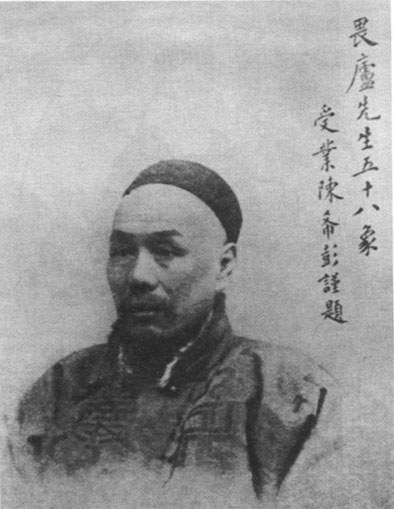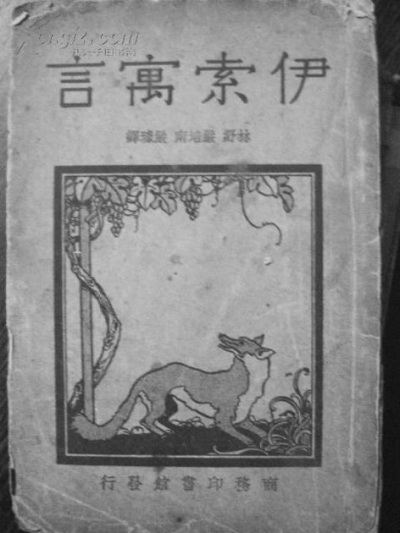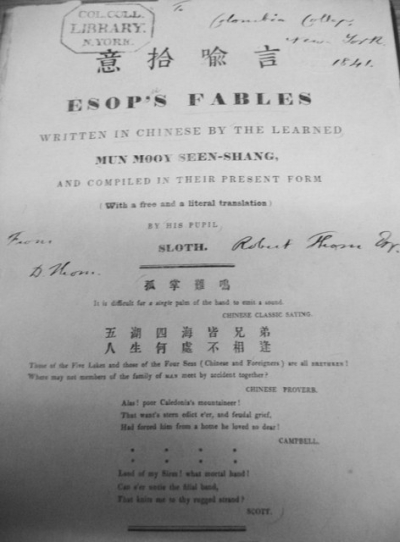



猴君狐臣
一日,各兽群聚一处,各道所长,以争王位。狮则自称力大,象则自认多谋,狐则久称慧智,马则恃其功高,于是各有所长,不相上下。末后来一猕猴,跳舞怪异,灵变百出,对答如流。于是,各兽推之为王,惟狐颇不输服,以为猴子小技,何足以当至尊?于是诡赚之曰:“大王在上,小臣有话启奏。现在某处有金一窖,必得大王亲往,方可取也。”猴以为然,即从狐往,见有生果贮于笼内,猴不能忍,伸手取之,殊被铁笼脱关,将手压住。猴骂曰:“狐乃奸臣,必须见罪。”狐曰:“我非奸臣,汝乃昏君!一手尚不能保,能为各兽王乎?”谚云:“位高者危。”是也。——《意拾喻言》
The Fox and the Monkey
A monkey once danced in an assembly of the Beasts,and so pleased them all by his performance that they elected him their King.A fox,envying him the honor,discovered a piece of meat lying in a trap,and leading the Monkey to the place where it was,said that she had found a store,but had not used it,she had kept it for him as treasure trove of his kingdom,and counseled him to lay hold of it.The monkey approached carelessly and was caught in the trap;and on his accusing the fox of purposely leading him into the snare,she replied,“O monkey,and are you,with such a mind as yours,going to be King over the Beasts?”——汤森本《伊索寓言》
汤森本与《意拾喻言》在形象性上的差别一目了然。首先,汤森本开头便说猴子因为一阵舞蹈赢得了动物们的认同,被推举为王,但狐狸不服。寥寥数语便完整地将情节概括出来。但在《意拾喻言》中,译者将这一情节进行扩充,使其更具形象色彩。译者列举了自称力大的狮子、自认多谋的大象、足智多谋的狐狸和自恃功高的马。紧接着,猴子从这些动物中脱颖而出,赢得了大家的认同。这样一来,译本便充分展现了动物们竞争的激烈性。豺烹羊
盘古初,鸟兽皆能言。一日,豺与羊同涧饮水,豺欲烹其羊,自念无以措辞,乃强责之曰:“汝浑浊此水,使老夫不能饮,该杀!”羊对曰:“大王在上流,羊在下流,虽浊无碍。”豺复责曰:“汝去年某日,出言得罪于我,亦该杀!”羊曰:“大王误矣。去年某日,羊未出世,安能得罪大王?”豺则变凶为怒,责之曰:“汝之父母得罪于我,亦汝之罪也。”遂烹之。谚云:欲加之罪,何患无辞。即此之谓也。——《意拾喻言》
The Wolf and the Lamb
Wolf,meeting with a Lamb astray from the fold,resolved not to lay violent hands on him,but to find some plea to justify to the lamb the wolf’s right to eat him.He thus addressed him:“Sirrah,last year you grossly insulted me.”“Indeed,”bleated the lamb in a mournful tone of voice,“I was not then born.”Then said the wolf,“You feed in my pasture.”“No,good sir,”replied the lamb,“I have not yet tasted grass.”Again said the wolf,“You drink of my well.”“No,”exclaimed the lamb,“I never yet drank water,for as yet my mother’s milk is both foodanddrinktome.”Uponwhichthewolfseizedhimandatehimup,saying,“Well!I won’t remain supperless,even though you refute everyone of my imputations.”The tyrant will always find a pretext for his tyranny.——汤森本《伊索寓言》
在语言上,汉译本有着明显的特色。首先,《意拾喻言》中的人称代词可谓千姿百态,而汤森本中只是“I”和“You”。在以上文本中,我们就可以看到“汝”、“我”、“尔”等代词。在其他故事中,我们甚至还可以看到“公”、“兄”、“足下”“壮士”等敬词。这些“敬词”正体现了中国古代的称谓特点。当然,也有像《豺烹羊》里提到的“老夫”,狼的这一自称正体现出其傲慢的神态。总的来说,仅仅在人称代词这一点上,《意拾喻言》都比汤森本形象丰富得多,简单的一个代词让人物的尊卑秩序、傲慢谦逊竞相展现,这不能不说是中国语言的神奇之处。| 欢迎光临 民俗学论坛-中国民俗学网 (http://chinafolklore.org/forum/) | Powered by Discuz! 6.0.0 |